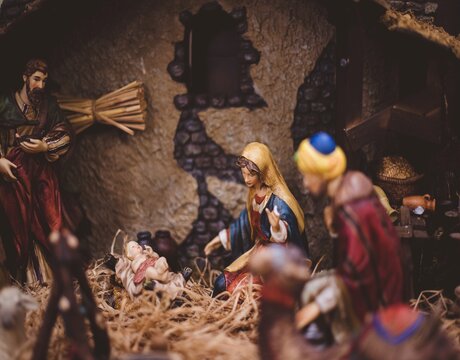Divine Retreat Centre UK – Official Website

BIBLE STUDY ON GENESIS: Comparison between Jesus and Joseph – Fr Joseph Edattu VC
December 20, 2021
Anticipating Advent with the Joyful Mysteries
December 20, 2021“For unto you is born this day in the city of David a Savior, who is Christ the Lord. And this will be a sign for you: you will find a baby wrapped in swaddling cloths and lying in a manger” (Luke 2:11-12)
“Once in our world, a Stable had something in it that was bigger than our whole world.” — C.S. Lewis
A king in a palace. A king on a throne. A king with a crown on his head. These are easy for the human mind to fathom; they meld with our logic. But a baby who is a king who is born in a stable and laid in a manger! Not even the most imaginative fairytale writer would have told such a tale. It took God, Creator of the whole world, to come up with this plan. And so it was that just once, a manger in a stable, held something greater than the whole world; a paradox to beat all others.
Paradoxes reveal the fallibility of human logic. Socrates, one of the greatest philosophers, concluded that “the only true wisdom is in knowing you know nothing” —a paradox itself. Another Greek philosopher, Chrysippos, came up with the paradox of the lie, which essentially poses the question: If someone says “I always lie”, are they telling the truth? Or are they lying? Now don’t tax yourself trying to find the answer, for it is said that the poet Philitas of Cos died of exhaustion attempting to resolve this paradox.
On a serious note though, reflecting on the paradox of the king in a manger yields heavenly lessons. It gives us food for thought about God Himself coming down, first to become a human being, and not a six foot tall strong guy, but a little newborn baby; the most helpless of all. It makes us wonder what the God who has the whole world in His hands (The earth is the Lord’s, and everything in it, the world, and all who live in it [Ps. 24:1]);and the cattle on a thousand hills (For every beast of the forest is mine, the cattle on a thousand hills [Ps. 50:10])meant by having a stable as His first bedroom and a manger for a crib.
Was He trying to tell us that being the smallest, being seemingly the most insignificant, being helpless can be great? That we should in fact strive to come down from high horses and become like little children? “I assure you and most solemnly say to you, unless you repent [that is, change your inner self—your old way of thinking, live changed lives] and become like children [trusting, humble, and forgiving], you will never enter the kingdom of heaven (Matt. 18:3, AMP)
Was He implying that we should not set our hearts on mansions and other shiny trinkets that the world has to offer, for “it is easier for a camel to go through the eye of a needle than for a rich person to enter the kingdom of God” (Matt.19:24)? He did model this by example when He pointed out that “Foxes have holes, and birds of the air have nests, but the Son of Man has nowhere to lay his head.” Was He letting us know that He was a king in search of a different type of palace, perhaps one more resembling a human heart?
But a manger is not the cleanest place, we reason, our human logic checking in once more. There are animals there. There’s dung. Like our hearts, where all kinds of dirt, envy, lust and hate may lurk. Until a king comes there. He turns the stable into a palace. He turns the miserable heart into a grand throne, and sits there if we let Him.
C.S. Lewis got it right again when he wrote: “The Son of God became a man to enable men to become sons of God.” For the stable did not turn Him into a pauper; it was He who turned the stable into a palace.
The paradoxes continue as Jesus is baptized. He chooses to become one of us. Son of Man. But can an ocean fit in a teacup? John the Baptist wonders that very thing. “I need to be baptized by you, and do you come to me?” (Matt.3:13). But perhaps, after all, that teacup needs the ocean to come in and change forever the nature of its contents. Salty. Now it is salted and it can salt those who have no flavour. “You are the salt of the earth, but if salt has lost its taste, how shall its saltiness be restored? (Matt.5:13).
Paradoxes. It seems the Kingdom of God has no shortage of these. A humble king. A king riding on a donkey, God on a cross. Crucified. Put to death by His own creation. Jesus in a tomb. God is dead? Perhaps He just wants to touch every part of the world and transform it. Then, Resurrection. “I have overcome the world” (John 16:33). Love came down from heaven and overcame death. The King in a manger. He changed the whole world. Nothing will ever be the same again.
He is still defying human logic. The Creator of the whole world in a tiny piece of bread. The Eucharist. And people eat the bread and they are changed. God in the heart of man. He is telling us that it doesn’t matter what situation we’re in… it only matters that Jesus is in our situation. “And we know that for those who love God all things work together for good, for those who are called according to his purpose” (Rom. 8:28).
King Jesus in a manger, we celebrate you in this season. Give us the grace to follow your example, and to become more like you. Amen.




